-
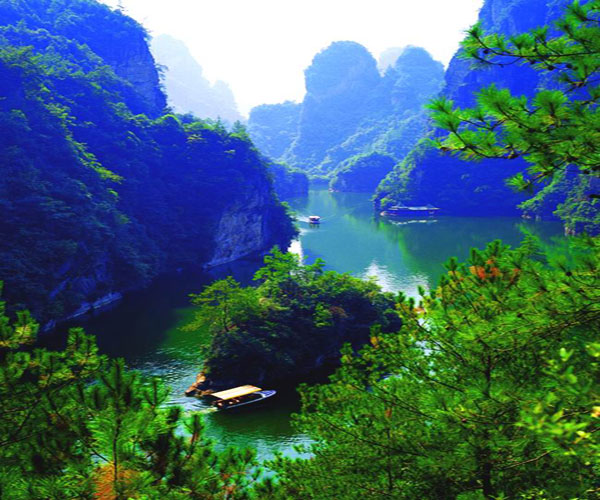
Where there is a mountain, there is water, and where a beautiful mountain exists, one can also find attractive water. The mountain .gives rise to the water, and the water is the mountains life-blood. The mountain is more splendid as it reflects the mountain. Gracious people enjoy the mountains, and wise ones relish the water.
HOT Wulingyuan District
2022-11-14 10:11
View:19760
-
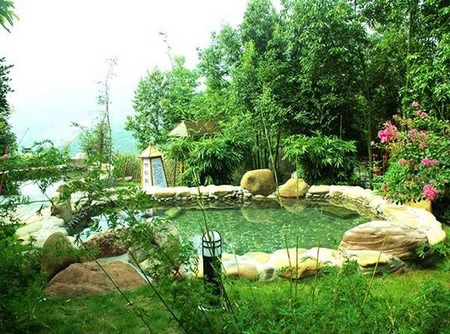
ZJJ Wanfu represents best wishes and happiness in Chinese. On the cultural background of blessing, Wanfu Hot spring is known as a marvelous spectacle in Zhangjiajie hot spring tourism, with an old natural spring that is able to outflow on its own. And the water here belongs to underground crevice water, which is available for drinking as well as bathing. The water current retains about0.39M3/S throughout the year and the water temperature keeps58℃all the time. Wanfu Hot Spring is rich in fluorin, lithium, metaboric acid, radon and various beneficial, healthful natural mineral substances.Diligent Tujia people and locals call it “Wanfu Spring” courteously. Before getting married, Tujia girls must take a shower in this spring in order to gain auspiciousness and health. Because it is generally believed that Wanfu Spring will wish you all happiness and good luck in the future.In August, 20th, 2007, Wanfu Hot Spring International Tourism Resort was rated as national AAAA tourist attraction by Chinese Scenic Spot Quality Evaluation Committee.Translated by Becky
HOT Cili County
2022-11-08 13:48
View:6881
-
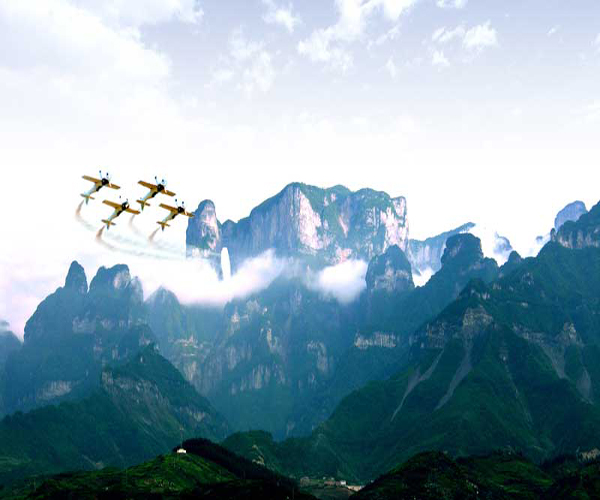
Tianmenshan Mountain,a famous mountain first recorded in the history of Zhangjiajie with an elevation of 1518.6 meters. It is 8 kilometers from the downtown and is one of the most representative natural sceneries of Zhangjiajie. For long time being,Tianmenshan.
Mountain attracts the attention of the peopl
HOT Yongding District
2022-10-10 09:31
View:65153
-
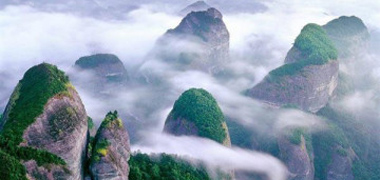
Langshan Mountain is one of China\'s National Geological Park famous for its unique Danxia landform. It is located in Xinning county,about 500 Km2 away from Changsha, capital of Hunan province. In the south Langshan Mountain is connected with Guilin, in the north it echoes Zhangjiajie.Covering an area of 108 square kilometres, Langshan Mountain has rich natural scenery and abundant tourism resources. There are more than 60 scenic spots in Langshan Mountain. Among which the most famous are Tianyi Lane, Chili Peak, Zixia Cave,Fuyi River, Innate Bridge, Bajiao Stronghold,Emperor Xun Forest Park and Xicun Ancient Dwelling. Experts from the International Union for Conservation of Nature (IUCN) will start reviewing danxia landform Sunday in southwest China\\\\\\\'s Guizhou Province which is applying to be included in the World Natural Heritage in 2010.Danxia, which means \\\\\\\"rosy cloud\\\\\\\", is a special landform formed from reddish sandstone that has been eroded over time into a series of mountains surrounded by curvaceous cliffs and many unusual rock formations.Attractions: Bajiao StrongholdThe Bajiao Stonghold is called the soul of Langshan mountain. It is famous for its fantastic and mysterious scenery. The best time to visit Baojiao Stronghold is when there is light mist. The mist braces the peaks below, it seems the whales paddling in the ocean. Also the mist rises slowly from below and kiss you, it seems you are in fairyland and forget you are a human being.The highest peak of Bajiao Stonghold is more than 818 metres high. It erects directly without any peaks around. The strangest is that there is a clean spring on top of this peak! You must wonder at nature\\\\\\\'s masterpieces!Chilli Peak Scenic Spot includes Chilli Peak, Camel Peak, Candle Peak, Yixiantian, Lianjigzai and more. But the most famous are Chilli Peak, Camel Peak and Candle Peak.The Chilli peak is the most marvelous peak in Langshan Mountain. It is 180 metres in height, the top is big and the bottom is small. Its shape is exactly like a mature Chilli soaring amoung hills. In year 2002, the spiderman Alain Robert successfully challenged the Chilli Peak.Camel PeakCamel peak is located in Shitian village. It consits of four stone summits. Each stone represents camel\\\\\\\'s head, body, ridge and tail respectively. Seeing far away, it is like a huge camel galloping in the wild field. On the side of camel peak there stands Candle Peak. It was said the candle lights the way for the camel during the night.Zixia CaveZixia Cave is actually not a really cave, but a canyon sourrounded by high red cliffs. There is one entrance to enter the canyon.It was said that the Zixia Cave is a mysterioius allure.When the sunset shines on the red cliffs, it reflects thousands of rosy cloud. The the whole canyon is full of purple rays and mystery. Hence the name of Zixia Cave(Rosy Cloud Cave).After entering Zixia Cave you can hear brook murmuring, bird singing happily and see splashing waterfalls, green bamboo and blooming wild flowers. It was said that the True Man(Immortal Man) of Zixia cultivated Tao here.The famous scenic spots in Zixia Cave includes Zixia Palace, Stone of Elephant Nose, Zixia Cliff, etc.Fuyi RiverOrigingated from Cat mountain in Guangxi province, the Fuyi River gets through the whole Langshan Scenic Area. It is the mother river of Xinning county. The water of Fuyi River is so clean that you can see fish and sand under it. The two sides are green bamboo and steep crags. The sand in the beach is pure and white. It is excellent river for drifting and rafting. Each summer it draws millions of people to drift along the river.Innate BridgeThe Innate Bridge is called the first bridge in the asia. The bridge is 64 metres long, 14 metres wide and 20 metres high. Its magnificent arc shape like a rainbow over the sky.Tianyi LaneThe original name of Tianyi Lane scenic spot is Ox Nose Castle. Because there is a lot of Ox nose shaped stone holes in the crag, hence the name of Ox Nose Castle. But the innate stone lane is the main feature of this scenic spot. It represents the classic characteristics of Danxia landform. So in year 2004, changed name to Tianyi Lane.Tianyi Lane is marvellous lane in the world. Only the God has power to make such a lane. The lane is 238.8 metres in length, and stone in two sides is more than 120 metres in height. The widest of lane is just 0.8 metres.When you walk along the lane you must shudder because everywhere is dark and the chilliness is coming upon you. But when there is sunshine gleaming on the stone wall, the marvellous and colorful ray panorama can be seen above. You have to marvel at nature\\\\\\\'s masterpiece. City: Shaoyang CityAddress: Xinning County of Shaoyang City, Hunan ProvinceHours:7:00-18:00 Admission: CNY 50 Transportation:There are long-distance buses to Shimen County in Changsha Western Station, which starts at 8:50,9:20, 10:30, 12:50 ,14:20,15:00 15:30,20:00 or 22:20. There are trains going to Shimen county at the Changsha Railway Station.The detailed information is listed in the table below.In Shimen Western Station, the Buses driving to Jiangping(江坪) and Nanping(南坪) can bring you to Huping Mountain.Hotel:Donghan Hotel(东汉大酒店) is opened to foreigners.Detailed information are followed:Best time to go From April to October. An average annual temperature is 62.6F.
HOT Hunan & Other regions
2022-10-08 20:06
View:10313
-
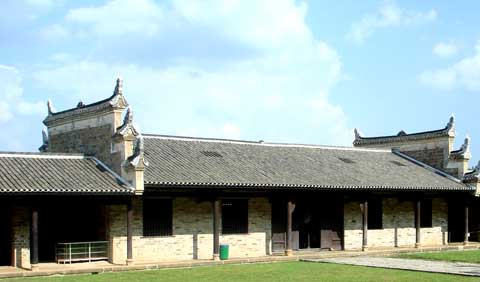
Situated in Heye Town, Shuanfeng County, Loudi, the tourist area is rich in tourism resources, and the representative buildings include Fuhou Hall, Baiyu (White Jade) Hall and Gold Hall. Fuhou Hall was the former residence of Zeng Guofan, the chief of the Hunan army at the end of the Qing Dynasty (1636-1912), and now it is a key historic monument under provincial protection.Transport: It takes only 30 minutes by car from Shuanfeng County to the destinationTel:(86)738-6012899Adimission(for reference): RMB 50 yuan/adultOpening hours: 8:00-18:00
HOT Hunan & Other regions
2022-08-27 17:29
View:4922
-
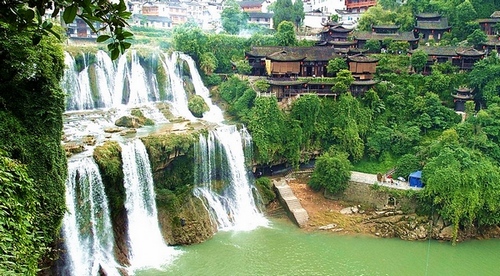
Furong Ancient Town, Furong (Hibiscus) Town is originally named Wangcun. It is an ancient town where Tujiazu people live together. Until now, in the town, pavement laid with black flagstones and ancient domestic house ( Mainly Diaojiaolou ) are well preserved. The famous movie Furong Town directed by Xiejin is shot here.
At F
HOT Xiangxi & Fenghuang & Huaihua
2022-08-25 19:17
View:10349
-
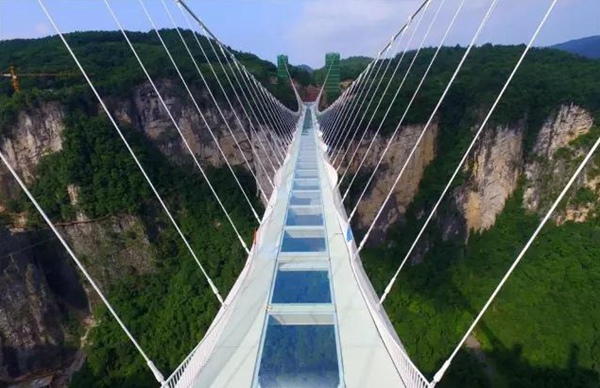
Zhangjiajie glass bridge is building between Lishuya and Wuwangpo of Zhangjiajie Grand Canyon.It is a landscape bridge, but also the scenic pedestrian traffic,tours, bungee jumping, Liusuo, T station, and other functions. Zhangjiajie glass bridge main span of 430 meters, 375 meters long bridge, 6 meters wide, height of about 300 meters. Zhangjiajie Grand Canyon entrance fee is CNY118,Glass bridge fee is not included in Zhangjiajie grand canyon\\\\\\\\\\\\\\\\\\\\\\\\\\\\\\\\\\\\\\\\\\\\\\\\\\\\\\\\\\\\\\\\\\\\\\\\\\\\\\\\\\\\\\\\\\\\\\\\\\\\\\\\\\\\\\\\\\\\\\\\\\\\\\\\\\\\\\\\\\\\\\\\\\\\\\\\\\\\\\\\\\\\\\\\\\\\\\\\\\\\\\\\\\\\\\\\\\\\\\\\\\\\\\\\\\\\\\\\\\\\\\\\\\\\\\\\\\\\\\\\\\\\\\\\\\\\\\\\\\\\\\\\\\\\\\\\\\\\\\\\\\\\\\\\\\\\\\\\\\\\\\\\\\\\\\\\\\\\\\\\\\\\\\\\\\\\\\\\\\\\\\\\\\\\\\\\\\\\\\\\\\\\\\\\\\\\\\\\\\\\\\\\\\\\\\\\\\\\\\\\\\\\\\\\\\\\\\\\\\\\\\\\\\\\\\\\\\\\\\\\\\\\\\\\\\\\\\\\\\\\\\\\\\\\\\\\\\\\\\\\\\\\\\\\\\\\\\\\\\\\\\\\\\\\\\\'s total ticket, if you choose walking on glass bridge, you will pay an additional fee CNY138.Spanning two cliffs in the Zhangjiajie Grand Canyon area, the glass bridge stretches 430 meters (1,410 feet) long and 6 meters (20 feet) wide, hovering over a 300-meter (984-foot) vertical drop.It is known as the world\\\\\\\\\\\\\\\\\\\\\\\\\\\\\\\\\\\\\\\\\\\\\\\\\\\\\\\\\\\\\\\\\\\\\\\\\\\\\\\\\\\\\\\\\\\\\\\\\\\\\\\\\\\\\\\\\\\\\\\\\\\\\\\\\\\\\\\\\\\\\\\\\\\\\\\\\\\\\\\\\\\\\\\\\\\\\\\\\\\\\\\\\\\\\\\\\\\\\\\\\\\\\\\\\\\\\\\\\\\\\\\\\\\\\\\\\\\\\\\\\\\\\\\\\\\\\\\\\\\\\\\\\\\\\\\\\\\\\\\\\\\\\\\\\\\\\\\\\\\\\\\\\\\\\\\\\\\\\\\\\\\\\\\\\\\\\\\\\\\\\\\\\\\\\\\\\\\\\\\\\\\\\\\\\\\\\\\\\\\\\\\\\\\\\\\\\\\\\\\\\\\\\\\\\\\\\\\\\\\\\\\\\\\\\\\\\\\\\\\\\\\\\\\\\\\\\\\\\\\\\\\\\\\\\\\\\\\\\\\\\\\\\\\\\\\\\\\\\\\\\\\\\\\\\\\'s longest and highest glass-bottomed bridge.Designed by architect Haim Dotan, who is also behind Expo 2010 Shanghai\\\\\\\\\\\\\\\\\\\\\\\\\\\\\\\\\\\\\\\\\\\\\\\\\\\\\\\\\\\\\\\\\\\\\\\\\\\\\\\\\\\\\\\\\\\\\\\\\\\\\\\\\\\\\\\\\\\\\\\\\\\\\\\\\\\\\\\\\\\\\\\\\\\\\\\\\\\\\\\\\\\\\\\\\\\\\\\\\\\\\\\\\\\\\\\\\\\\\\\\\\\\\\\\\\\\\\\\\\\\\\\\\\\\\\\\\\\\\\\\\\\\\\\\\\\\\\\\\\\\\\\\\\\\\\\\\\\\\\\\\\\\\\\\\\\\\\\\\\\\\\\\\\\\\\\\\\\\\\\\\\\\\\\\\\\\\\\\\\\\\\\\\\\\\\\\\\\\\\\\\\\\\\\\\\\\\\\\\\\\\\\\\\\\\\\\\\\\\\\\\\\\\\\\\\\\\\\\\\\\\\\\\\\\\\\\\\\\\\\\\\\\\\\\\\\\\\\\\\\\\\\\\\\\\\\\\\\\\\\\\\\\\\\\\\\\\\\\\\\\\\\\\\\\\\\'s Israel Pavilion, the bridge deck is wholly paved with transparent glass and can carry 800 people. Built among high mountains and canyon, it also has a bungee platform in the center. The bridge will serve as a runway for fashion shows.The bridge is made of three layers of the tempered glass, all together 99 pieces, each of 3 by 4.5 meters and 15 mm thick. Damaged pieces can be removed and changed.Zhangjiajie inspired the scenery in the hit movie \\\\\\\\\\\\\\\\\\\\\\\\\\\\\\\\\\\\\\\\\\\\\\\\\\\\\\\\\\\\\\\\\\\\\\\\\\\\\\\\\\\\\\\\\\\\\\\\\\\\\\\\\\\\\\\\\\\\\\\\\\\\\\\\\\\\\\\\\\\\\\\\\\\\\\\\\\\\\\\\\\\\\\\\\\\\\\\\\\\\\\\\\\\\\\\\\\\\\\\\\\\\\\\\\\\\\\\\\\\\\\\\\\\\\\\\\\\\\\\\\\\\\\\\\\\\\\\\\\\\\\\\\\\\\\\\\\\\\\\\\\\\\\\\\\\\\\\\\\\\\\\\\\\\\\\\\\\\\\\\\\\\\\\\\\\\\\\\\\\\\\\\\\\\\\\\\\\\\\\\\\\\\\\\\\\\\\\\\\\\\\\\\\\\\\\\\\\\\\\\\\\\\\\\\\\\\\\\\\\\\\\\\\\\\\\\\\\\\\\\\\\\\\\\\\\\\\\\\\\\\\\\\\\\\\\\\\\\\\\\\\\\\\\\\\\\\\\\\\\\\\\\\\\\\\\"Avatar,\\\\\\\\\\\\\\\\\\\\\\\\\\\\\\\\\\\\\\\\\\\\\\\\\\\\\\\\\\\\\\\\\\\\\\\\\\\\\\\\\\\\\\\\\\\\\\\\\\\\\\\\\\\\\\\\\\\\\\\\\\\\\\\\\\\\\\\\\\\\\\\\\\\\\\\\\\\\\\\\\\\\\\\\\\\\\\\\\\\\\\\\\\\\\\\\\\\\\\\\\\\\\\\\\\\\\\\\\\\\\\\\\\\\\\\\\\\\\\\\\\\\\\\\\\\\\\\\\\\\\\\\\\\\\\\\\\\\\\\\\\\\\\\\\\\\\\\\\\\\\\\\\\\\\\\\\\\\\\\\\\\\\\\\\\\\\\\\\\\\\\\\\\\\\\\\\\\\\\\\\\\\\\\\\\\\\\\\\\\\\\\\\\\\\\\\\\\\\\\\\\\\\\\\\\\\\\\\\\\\\\\\\\\\\\\\\\\\\\\\\\\\\\\\\\\\\\\\\\\\\\\\\\\\\\\\\\\\\\\\\\\\\\\\\\\\\\\\\\\\\\\\\\\\\\\" and members of the production team spent time among the pillar-like mountains taking notes and sketches that would inform many elements of the animation.
HOT Cili County
2022-08-21 11:35
View:9495
-
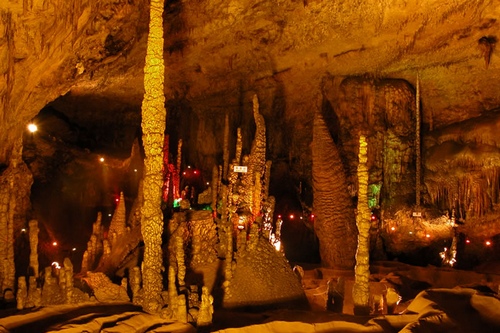
Jiutian Cave is named for its nine skylights, which are interlinked with ground. It is located in Sangzhi County(Zhangjiajie,Hunan province), 62 kilometers away from Wulingyuan, 70 kilometers away from the city enter of Zhangjiajie. There are three layers within the cave, covering 2.5 million square meters in total. Entering into Jiutian Cave, you may be surprised by all kinds of treasures it owns, its countless postures as well as the unique stalagmites, curtains, stalactites. In a word,Jiutian Cave is generally seen as an unusual rarity which can be seldom seen elsewhere around the world.Jiutian Cave was found in 1987 by a man named Wang Hairan who was fond of adventure. In 1988, officially,Jiutian Cave was opened to visitors as a provincial scenic spot.In 1987, more than 20 experts coming from 17 countries had an on-the-spot investigation in Jiutian Cave, and then successfully confirmed the status of Jiutian Cave——the largest cave in Asia. In 1995, Jiutian cave was identified as the exploration base of International Karst Cave Association (only2 inChina) and also ranked among International Karst Cave Association (only 3 nationwide). Since then,Jiutian Cave got to be known by the whole world gradually. Accordingly, its various values multiplied rapidly.Generally speaking, there are four outstanding points in Jiutian Cave:1, largest area2, peculiar cave3, fascinating scenery4, serene spaceTranslated by Becky
HOT Sangzhi County
2022-08-20 08:08
View:6438












